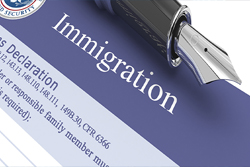The awareness of the current legislation of the UAE is important for foreign citizens who have chosen the United Arab Emirates for employment. Knowledge of laws is necessary to ensure that people are aware of their rights and ways of protection when any unexpected circumstances arise. It is especially relevant for foreign employees.
It is not a secret that the labor market of UAE experiences a constant shortage of qualified personnel. That is why Dubai, Ras Al Khaimah and other Emirates take leading positions on the international labor market. There are industries where the demand for skills grows constantly. Development of construction and tourism industry stimulates the need for professionals in the service sector. Hotel and tourism business, management and international trade – all require personnel. Today everyone has an opportunity to get a high-paying job in UAE, irrespective of ethnic, religious or state affiliation. It should be noted that specialists with knowledge of multiple foreign languages are highly valued among the international workers in the Emirates.
Norms of immigration legislation
In fact, the entire legal framework of the United Arab Emirates operates in accordance with the international legal norms and standards, and immigration law is not an exception. At the same time, it possesses its own characteristic features. First of all, the national citizenship of the UAE is never granted to the foreign citizens, no matter how many years they have spent on the territory of the country. The procedure of employment visa processing is regulated by the Federal legislation, and the legal support of immigration processes is carried out in accordance with the Decree from 1997. The foreign citizens, who come to the United Arab Emirates on a vacation trip, must obtain the appropriate visa. This rule does not apply to the citizens of the Gulf States (Saudi Arabia, Oman, Bahrain, Kuwait, Qatar, etc.). The entry visa is issued on arrival for foreign citizens from countries, which have signed a visa free regime with United Arab Emirates. Such a visa is valid no more than 60 calendar days and may be prolonged up to 1 additional month.
Types of visas in the UAE – Dubai, Ras Al Khaimah and other Emirates
The law of UAE distinguishes several types of visas for foreign citizens, depending on the purpose of the visit, in particular:
- Transit Visa for visiting the country;
- Tourist visa;
- Visa for multiple visits of the country;
- Visit visa;
- Visa with the status of a tax resident;
- Temporary visa (up to 60 calendar days).
One must possess a residence permit for full-fledged and legal residence on the territory of Dubai, Ras Al Khaimah and other Emirates. If a foreign citizen has obtained a visa with the status of a resident, he timely must submit documents for renewal of the residence permit prior to the expiration date of the existing visa. The residence permit is granted for a period of up to 3 years, and can be either with a work permit, or without it. If the foreigner signs a labor contract in the United Arab Emirates, he must obtain a work visa. The employer acts as sponsor when obtaining such a visa. This document (visa) loses its legal force, if the person, who has obtained a residence permit, is not present on the territory of the UAE for more than half of a year.
Resident visa is sometimes called a residence permit. There are following types of permissions in Dubai and Ras Al Khaimah:
- Investor / business owner / property owner residence permit;
- Permission to work as company owner;
- Employee residence permit.
In conclusion, it should be noted that it is almost impossible to obtain a permanent residence permit or citizenship in UAE. However, the procedure of obtaining a typical residence permit in Dubai, Ras Al Khaimah and other Emirates, for the period of 3 years, with the possibility of further prolongation, is clearly regulated and does not cause many difficulties, especially if you will apply with the assistance of those, who are regularly engaged in issuing of such visas.
Rules of the labor law of UAE
Main elements of the labor relations in the United Arab Emirates is regulated by the rules of the Labor Code. It is a joint legislative project of the National Immigration Service of the UAE and the Ministry of Labor. The rules of labor law are aimed at protection of the rights and freedoms of employees irrespective of their ethnic or nationality affiliation.
In accordance with the applicable law of UAE, the permissible length of a working day is 8 hours. In the light of the specific features of the hotel and tourism industries, the working day may be extended to 9 hours, but the overtime work must be paid accordingly. Calculation of the overtime work is carried out on an hourly basis. This also applies to the weekends and public holidays. If the employee has worked more than six months, two vacation days are added to each further month.
The employer in Dubai or Ras Al Khaimah may establish a probationary period (up to 6 months) before hiring the employee for a permanent work. During this period, the employer may terminate the employment contract provided a one day resignation notice. As a rule, such dismissals are of a purely objective nature and have valid reasons. If the employee is dismissed after completion of the probationary period, he must be notified one month in advance. The employers in the UAE do not pay for the medical certificates of incapacity to work during the probationary period.
A severance pay is paid to the employee in the UAE upon the completion of the validity period of the employment contract. The calculation of this compensation includes the sum of the salary for 21 working days during the first five years (for each year), and the sum of 30 days salary. The total amount of compensation should not exceed the amount of salary for the period of two years.
If the employment contract in Dubai, Ras Al Khaimah or any other Emirate was terminated at the initiative of one of the parties, a prohibition to conduct labor activities in the Emirates may be imposed on a foreign citizen upon the request of the employer. The prohibition is valid during the period of 6 months. In the cases when the employment contract was terminated because of the gross violations of the rules and norms of the current legislation, such period may be up to 1 year.
As to the qualification requirements to the foreign job seekers in the United Arab Emirates, it can be said that they are quite ordinary – as in any other country. They include qualifications and education, professional skills and working experience, knowledge of foreign languages and physical health.












